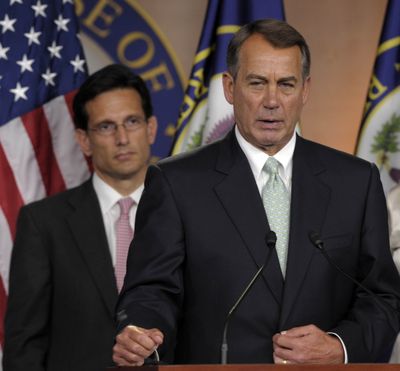Debt-defying GOP gets stern warning
Leaders warn of consequences

WASHINGTON – Republican leaders in the House have begun to prepare their troops for politically painful votes to raise the nation’s debt limit, offering warnings and concessions to move the hard-line majority toward a compromise that would avert a federal default.
For weeks, GOP conservatives, particularly in the House, have issued demands about what they would require in exchange for their votes to increase the federal debt limit. In negotiations with the White House, Republican leaders have found those demands were unattainable. Unwilling to risk the economic and political consequences of a federal default, which could come as early as Aug. 2, they have started the difficult process of standing down.
At a closed-door meeting Friday, GOP leaders turned to their most trusted budget expert, Rep. Paul Ryan, R-Wis., to explain to rank-and-file members what many others have come to understand: A fiscal meltdown could occur if Congress fails to raise the debt ceiling.
House Speaker John Boehner of Ohio underscored the point to dispel the notion that failure to allow more borrowing is an option.
“He said if we pass Aug. 2, it would be like ‘Star Wars,’ ” said Rep. Scott DesJarlais, a freshman from Tennessee. “I don’t think the people who are railing against raising the debt ceiling fully understand that.”
The warnings appeared to have softened the views of at least some House members who, until now, were inclined to dismiss statements by administration officials, business leaders and outside economists that the economic impact would be dire if the federal government were suddenly unable to pay its bills.
Freshman Rep. Steve Womack, R-Ark., said the presentation about skyrocketing interest rates that could result from downgraded bond ratings was “sobering.”
“It illustrates to us that doing nothing is unacceptable,” he said. “I think the conference understands this is a defining moment for us. It’s time to put the next election aside.”
At the same time, Republican leaders orchestrated a series of public moves intended to soften the blow for conservatives. They agreed to give the House an opportunity to vote on two top conservative priorities – a so-called cut-cap-and-balance bill, which would order $111 billion in cuts in federal programs for 2012 and impose a cap on future spending, and a constitutional amendment that would require a balanced federal budget.
The Democratic leadership in the Senate is also expected to allow votes on one, and perhaps both, measures. Neither is expected to become law – the constitutional amendment would require a two-thirds vote in both chambers – but the chance to vote could appeal to the tea party conservatives in the House who are most skeptical of any deal with the White House to raise the debt limit.
Congress is likely to spend much of next week on those measures, then could take up a debt-ceiling measure in the Senate toward the end of next week. Senate leaders believe they would need a week to overcome a likely filibuster by conservative senators who oppose any debt-ceiling increase.